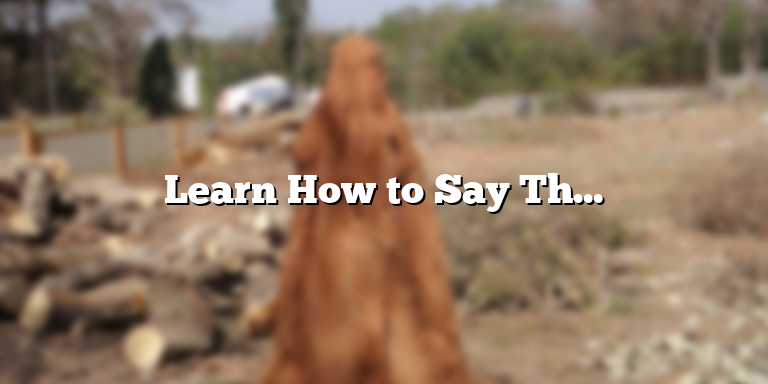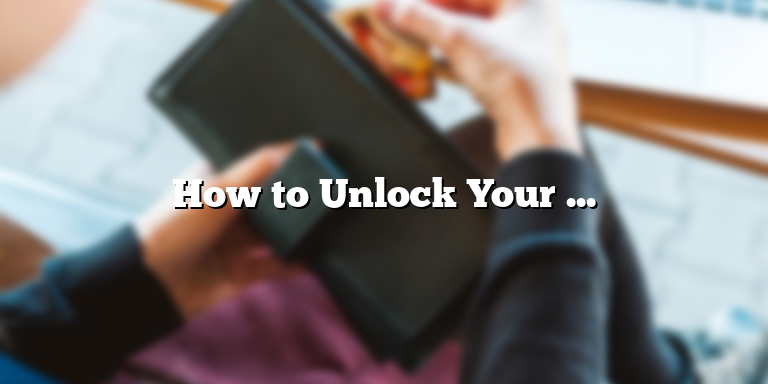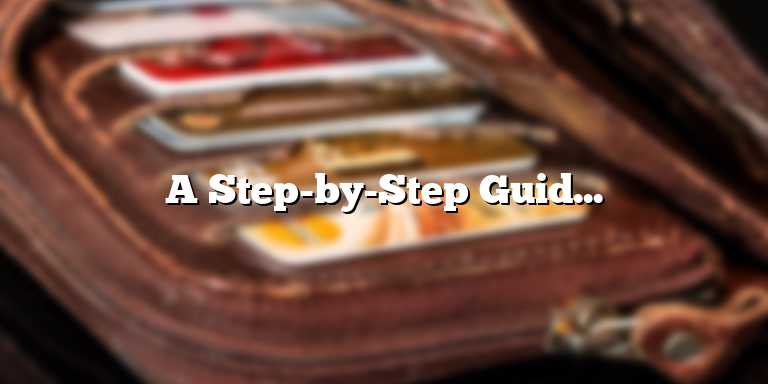
What Is Thank You in Hebrew?
If you are planning to visit Israel or simply interested in learning a new language, knowing how to say “thank you” in Hebrew is a great start. The Hebrew language is widely spoken by Jews worldwide, and it is also becoming increasingly popular among those who have an affinity for the language and culture. One important phrase you should know is “todah” (תודה).
“Todah” is a Hebrew word that translates to “thank you” in English and is pronounced as \toe-dah\. Though it sounds simple, the word “todah” has a deeper meaning in Hebrew. In the Hebrew Bible, “todah” is used along with the word “korban” to refer to a sacrifice or offering given to God in thanksgiving for His goodness.
Nowadays, “todah” is commonly used to express gratitude in everyday conversations. Expressing gratitude is a significant part of Israeli culture, and “todah” is a term used to show appreciation. Whether you are thanking someone for a simple favor or expressing your gratitude after receiving a gift, “todah” is the perfect phrase to use.
Aside from “todah,” there are also a few variations of “thank you” in Hebrew that you may encounter:
- “Todah Rabah” (תודה רבה) – This is a more formal way of expressing gratitude and translates to “thank you very much.”
- “Todah Lach” (תודה לך) – This phrase is used to address a female and translates to “thank you to you.”
- “Todah L’cha” (תודה לך) – This phrase is used to address a male and translates to “thank you to you.”
- “Toda Eyal” (תודה אייל) – This phrase is used to show appreciation and gratitude to someone named “Eyal.”
Learning how to say “thank you” in Hebrew is an excellent way to immerse yourself in Israeli culture and build connections with the locals. Using “todah” or any variation of the phrase can make a positive impression and set a good tone for any conversation.
In conclusion, the word “todah” is the simplest and most common way to say “thank you” in Hebrew. Whether you are in Israel or just trying to learn a new language, practicing the various ways to express gratitude can help to improve your Hebrew skills and enrich your understanding of the culture.
When to Say Thank You in Hebrew?
When it comes to expressing thanks in Hebrew, the language has evolved to meet modern needs. In most cases, saying “thank you” in Hebrew is appropriate after receiving a gift, favor, or other kindness. This is a basic rule that applies to all social situations, both formal and informal. But there are other times when you might want to show gratitude, such as when you receive good news or when someone has done you a kindness without expecting anything in return.
In addition to acknowledging a gift or favor, you may also want to express your thanks when someone has gone out of their way to help you or to provide you with information that you needed. This can take the form of writing a personalized note or sending a small gift, such as flowers or chocolates.
If you are not sure whether to say ‘thank you’ in Hebrew, it is always better to err on the side of politeness. This means that anything that you think might require acknowledgement is probably worth expressing thanks for. Just remember to use formal language when talking to people you don’t know well or in formal situations such as work or business interactions.
Another time to express thanks in Hebrew is when you receive compliments or when someone has recognized your achievements. In this case, you might use the phrase “todah Rabah” which means “thank you very much”. This phrase can be used in a variety of settings, from social interactions to academic or professional achievements.
Finally, it’s worth noting that in Hebrew culture, expressing gratitude is an important part of building meaningful relationships. By taking the time to thank people for their time and effort, you are showing that you value their contribution and are willing to go the extra mile to show appreciation.
In conclusion, saying “thank you” in Hebrew can be done in a variety of situations, from receiving a gift to recognizing achievements. By taking the time to acknowledge the contributions of others, you are building meaningful relationships and expressing your values.
Expressions of Thanks in Hebrew
Hebrew is considered one of the oldest languages in the world, and expressing gratitude is an inherent part of its culture. If you’re looking to say thank you in Hebrew, there are various ways to do so, beyond the standard “todah” (תודה). Here are some expressions of thanks that you can use to convey different levels of gratitude.
Todah Rabah
If you want to emphasize your appreciation for someone’s help or kindness, you can say “todah rabah” (תודה רבה), which translates to “thank you very much.” This expression is used in formal and informal settings and is considered more heartfelt than the standard “todah.”
Yashar Koach
“Yashar Koach” (ישר כח) is another way to express gratitude in Hebrew. It literally means “straight power” or “good job,” but it is used to acknowledge someone’s effort or contribution. For example, if someone helped you complete a task, you can say “yashar koach” to show your appreciation for their hard work.
Todah Al HaEzor
“Todah al ha’ezor” (תודה על העזר) means “thank you for your help.” If someone assisted you in accomplishing a task or solving a problem, you can use this expression to express your gratitude specifically for their help.
Todah Al HaSimcha
If someone gave you a gift or made your day better in some way, you can use the phrase “todah al ha’simcha” (תודה על השמחה), which means “thank you for the joy.” This expression shows that you appreciate not only the gift but also the positive emotions that come with it.
Todah Meod
“Todah meod” (תודה מאוד) is a simple yet effective way to say “thank you very much.” This expression is used in various contexts, from thanking a waiter for good service to thanking a friend for their support.
Toda Shelcha/Shelach
If you’re thanking someone and want to add a personal touch, you can use the phrases “toda shelcha” (תודה שלך) or “toda shelach” (תודה שלך), which mean “thanks to you.” These expressions are more informal and can be used with friends and family members.
Todot Rabbah
“Todot rabbah” (תודות רבות) is a way to express gratitude in the plural form. It is used to thank multiple people or to show appreciation for a group effort. For example, if you collaborated with several colleagues on a project, you can say “todot rabbah” to thank them all at once.
In conclusion, learning how to say thank you in Hebrew is a great way to show appreciation and respect for the language and culture. By using these different expressions of gratitude, you can convey different levels of appreciation and personalize your thanks to fit the situation. So next time you want to express your gratitude in Hebrew, try using one of these phrases and see how it can make a difference.
Etiquette for Thanking in Hebrew
It’s always a good idea to understand the cultural customs associated with expressing gratitude in a foreign language. In Hebrew, there are certain manners and gestures that are important to note when saying thank you.
Addressing Elders
Hebrew culture places a great deal of importance on respecting elders. When saying thank you to someone older than oneself, it’s customary to use the honorific title of “rabbi” or “morah” if they’re a teacher. If you’re unsure of the person’s title, you can simply say “shekhinah” which means “may God’s presence be with you”.
Thanking Colleagues
When thanking colleagues or someone of a similar age or status, the appropriate way to say thank you in Hebrew is “todah” (תודה). You can also say “todah rabah” (תודה רבה) to express greater gratitude. It’s important to note that Hebrew is a gendered language, so if you’re thanking a woman specifically, you would say “toda” instead of “todah”.
Body Language
In addition to verbal expressions of gratitude, body language is an important aspect of Hebrew culture. When saying thank you, it’s customary to look the person in the eye and smile. It’s also common to shake hands, especially when thanking someone in a professional setting.
Following Up
Further etiquette to follow when thanking someone in Hebrew is to make sure to follow up with a message or card. Whether it’s a handwritten note or a text message, taking the time to follow up and express gratitude again will be greatly appreciated. Additionally, try to be specific in your message, mentioning what specifically you’re grateful for.
In Conclusion
By following these Hebrew customs and manners, you can express gratitude in a way that is both culturally respectful and personal. Whether it’s expressing gratitude to a colleague or senior citizen, or inquiring about honorifics and using the appropriate titles, there are plenty of ways to say thank you in Hebrew. Keep these etiquette tips in mind when communicating with Hebrew speakers to show your gratitude and respect.






